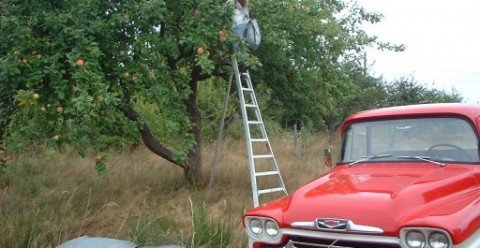
If you have garden space to spare or a fruit tree that produces more apples, pears or plums than you can use, there may be an organization near you eager to plant vegetables in that space or pick that fruit to distribute or sell in your community. Connecting locally grown food with people in the community is the goal of these groups, all dedicated to making the most of urban agriculture.
Some organizations, such as Backyard Bounty in Guelph, Ont., are small businesses with one or more paid employees; others are registered charities. Whatever the group’s business model, the aim is to increase urban agriculture by finding more spaces to plant food, or harvest, share and sometimes sell produce that might otherwise go to waste.
For example, Backyard Bounty partners with homeowners and community members to grow vegetables in backyards and on converted lawns using organic growing practices. At the beginning of each season, it sells memberships to local residents, entitling them to a weekly box of vegetables. Excess produce is sold to farmers’ markets and restaurants. There are more than 30 gardens in Guelph, most of which are tended by volunteers who are given a portion of the produce for their efforts; homeowners receive a portion, as well.
“Our volunteers include kids and adults of all ages,” says Robert Orland, Backyard Bounty founder. “They’re people looking for a volunteer activity they can do in the city for a few hours at a time.”
Other initiatives, such as Toronto’s Not Far From The Tree (NFFTT) and the Vancouver Fruit Tree Project, are among the several fruit tree-harvesting projects across Canada that use volunteers to pick and redistribute residential fruit to community organizations. These organizations then distribute a portion of the harvest to needy families and individuals, as well as to daycare centres, community kitchens, food banks and homes for the elderly. The remainder of the harvest goes to the fruit tree owners and to the volunteers.
The range of fruit harvested by these groups is impressive. Last summer, NFFTT volunteers picked more than 8,135 pounds (3,690 kg) of produce, including sweet and sour cherries, serviceberries, mulberries, apricots, plums, crabapples, pears, sumac, elderberries, apples, black walnuts and ginkgo nuts.
As interest in eating locally grown food increases, so does the appetite for such community endeavours. “We have had a steady stream of homeowners contacting us to harvest their fruit, and an even steadier stream of interested volunteers willing to help pick,” writes Juby Lee, project coordinator for the Hamilton Fruit Tree Project in Ontario, on that group’s website.
Another group promoting shared urban harvests is LifeCycles through their Fruit Tree Project. LifeCycles is a non-profit organization in Victoria, which promotes personal, shared and community gardens. It has set up a telephone hotline, staffed by volunteers, to provide advice and resources on urban agricultural activities.
For more information on these and similar programs, contact:
• Backyard Bounty, Guelph, Ont., www.backyardbounty.ca
• Not Far From The Tree, Toronto, www.notfarfromthetree.org
• Hamilton Fruit Tree Project, Hamilton, Ont., www.hamiltonfruittreeproject.blogspot.com
• LifeCycles—Fruit Tree Project, Victoria, B.C., www.lifecyclesproject.ca
• Vancouver Fruit Tree Project, Vancouver, www.vcn.bc.ca/fruit/home.html
• Summerland Fruit Tree Project, Summerland, B.C., Summerland Fruit Tree Project
• The Guelph Fruit Tree Project, Guelph, Ont., www.appleseedcollective.org
• The Edible Garden Project, North Vancouver, www.ediblegardenproject.com
This article was originally published in the Summer 2010 issue of Garden Making magazine.

We are offering, for free picking, ginkgo fruits/nuts. Property 28 Tweedsmuir Ave, Dundas, ON. Tel. 905-627-9248.